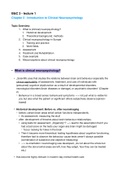B&C 2 - lecture 1
Chapter 2 - Introduction to Clinical Neuropsychology
Topic Overview:
1. What is (clinical) neuropsychology?
1. Historical development
2. Theoretical background; methods
2. Clinical neuropsychology in Europe
1. Training and practice
2. Work fields
3. Assessment
4. Treatment and Rehabilitation
5. Case example
6. Misconceptions about clinical neuropsychology
• What is clinical neuropsychology?
• „Scientific area that studies the relations between brain and behaviour especially the
clinical applicability of assessment, treatment, and care of individuals with
(presumed) cognitive (dys)function as a result of developmental disorders,
neurological disorders (brain diseases or damage), or psychiatric disorders“ (Chapter
2)
- Behaviour in a broad sense: behavioural symptoms —> not just what is visible for
you but also what the patient or significant others subjectively observe (opinion-
based)
• Historical development: Before vs. after neuroimaging
- before: certain brain areas entail certain functions independently
• As assessment: measuring the skull
- after: development of theories about brain-behaviour relationships;
• using tests for assessment: „Organicity“? —> lead to the assumption that if you
had a bad score on the tests your organ aka brain might be damaged
- focus: looking for holes in the brain
• Then it became more theoretical: testing hypotheses about cognitive functioning,
therefore had to observe the behaviour cause tests weren’t always possible
(combination of subjective and objective measuring)
• —> re-orientation: neuroimaging was developed, „its not about the whole but
about the donut (what areas are left, how they adapt, how they can be treated
etc.)
• Has become highly relevant in modern-day mental health care:
, - Increase in people with brain damage/dysfunction
• Decrease in mortality rates, better health care
• Aging
• More interest in quality of life
• Cost of brain diseases: a burden or a challenge?
• —> a clinical neuropsychologist is a scientist practitioner focused on behaviour and
cognition
• —> is not a brain researcher
• The brain has „persuasion“: all aspects are frequently talked about, have become
„fancy“
• Clinical neuropsychology in Europe:
• Working with all age groups
• Working in a wide range of clinical settings
• Its multidisciplinary: working together with neurologists, neurosurgeons,
psychiatrists etc.; also with speech therapists, health psychologists etc.
• Various aspects are important: Brain dysfuntioning, psychosocial, developmental,
contextual, somatic, performance validity factors
• Not just diagnostics but also highly involved in treatment
• The International Classification of
Functioning-ICF (WHO, 2001):
- Useful in clinical neuropsychology:
• Description of consequences of brain
disease/disorder at three levels:
impairment - limitation - restriction
• Identify moderating factors (individually
defined e.g. your work environment)
• Relevant for understanding subjective
complaints and problems in daily life
• Identify target for treatment or
optimisation
- Example:
• Competencies:
- Scientific knowledge about various
subtopics and all kinds of mental
dysfunctions, psychological, neurological
dysfunctions
- Diagnostic, conversational competencies
, • Workfields:
- Hospitals
- Rehabilitation centres
- Mental health care
- Residential homes, Nursing homes, supported housing
- Forensic institutions (work environment within a strict legal framework)
• Assessment:
• Testing hypothesis:
- Multi-informed
• patient
• significant others
- Multi-method
• tests: usually a predetermined set of tests
• questionnaires
• clinical interview: provides a lot of subjective information
• observation: important with regard to cognitive functioning
• —> integrate all info and reflect on validity and reliability
- Multi-conceptual
• neuropsychological
• personality
• contextual environment
- Bio-psycho-social model
- Diagnostic cycle:
• Complaints analysis
• Problem analysis
• Diagnosis
• Indication for treatment
- Assessment is more than testing!
- Issues/critical points:
• Underperformance: patient does
not make a normal effort; could be
the case of inconsistencies within
the test profile, a striking
discrepancy between behavioural
, observations and test performance, or if patient’s complaints are not in line with
the severity of the disorder
• Confounders
• Reliability of the methods
• Validity of the methods
• Case example:
B&C 2 - lecture 2
Chapter 18 - Memory disorders: Amnesic syndrome, Korsakoff’s
syndrome and other alcohol-related cognitive disorders
Topic Overview:
7. Recap: memory systems
8. Working memory and long-term memory
9. Binding and consolidation
10. The medial temporal lobe
11. The amnesic syndrome
12. Korsakoff’s syndrome
13. Impaired and spared memory functions
14. Other alcohol-related cognitive disorders
15. Assessment of memory (dys)function
• Memory disorders:
• Are memory problems a sign of brain damage?
- Adjusting to changes in routine






